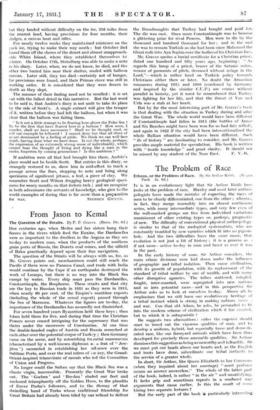From Jason to Kemal
The Question of the Straits. By P. P. Graves. (Bean. 10s. 6d.) Dpi centuries ago, when Medea and her sisters hung their fleeces in the rivers which feed the Euxine, the Dardanelles were as important to the dwellers in the Aegean as they are to-day to modern man, when the products of the southern grain ports of Russia, the Donetz coal mines, and the oilfield of Baku practically depend upon their free navigation.
The question of the Straits will be always with us, for, as Mr. Graves points out, merchantmen could still reach the Pacific if there were no Panama Canal, and trade with India would continue by the Cape if an earthquake destroyed the work of Lesseps, but there is no way into the Black Sea except by water. Every ship must pass the Dardanelles, Constantinople, the Bosphorus. These straits and that city are the key to Russian trade in 1931 as they were in 1913, when nearly 60 per cent, of the Empire's maritime exports (including the whole of the cereal export) passed through the Sea of Marmora. Whatever the figures are to-day, the importance of the Dardanelles has assuredly not diminished.
For seven hundred years Byzantium held these keys ; then Islam held them for five, and during that time the Christian Powers never ceased intriguing for the supremacy that was theirs under the successors of Constantine. At one time the double-headed eagles of Austria and Russia screeched at each other over the potential corpse of Turkey ; then Germany came on the scene, and by astonishing tin meial manoeuvres (characterized by a well-known diplomat a; a feat of " Jew- jitsu ") succeeded in establishing' her nflaence over the Sublime Porte, and over the real rulers of 'I u:key, the Grand- Orient-inspired triumvirate of rascals who led the Committee of Union and Progress.
No longer could the Sultan say that the Black Sea was a chaste virgin, inaccessible. Presently the Great War broke out. The Goeben ' and ' Breslau ' eluded our fleet and anchored triumphantly off the Golden Horn,' to the plaudits of Enver Pasha's followers, and to the dismay of that dwindling band of Turks whose traditional friendship fbr Great Britain had already been tried by Our'refusal to deliver the Dreadnoughts that Turkey had bought and paid for. The die was cast. Once more Constantinople was to become a glittering prize for rival Powers. Men were to die by the thousand and hundred thousand for her ; and in the end she was to remain Turkish as she had been since Mahomed the Ghazi rode into Aya Sophia over the bodies of his Christian foes.
Mr: Graves quotes a burial certificate for a Christian priest, dated one hundred and fifty years ago, beginning : "As regards this lump of a priest, bearer of the Satanic mitre, wearer of garments of pitch, deceased without refuge in the Lord,"—which is rather hard on Turkish policy towards Christians either then or later. No , doubt the Armenian massacres during 1915 and 1916 (condoned by Germany and inspired by the sinister C.U.P.) are crimes without parallel in history, yet it must be remembered that Turkey was fighting for her life, and that the threat at Van and Urfa was a stab at her heart.
But by far the most interesting part of Mr. Graves's book is that dealing with the situation in Turkey during and after the Great War. The whole world would have been different if Constantinople had fallen in 1915 (the battles of Anzac and Six Beaches might have been won for us had fate willed), and again in 1922 if the city had been internationalized the whole Balkan situation would have been different. Such "ifs of history" are fascinating to consider, and Mr. Graves provides ample material for speculation. His book is written with "inside knowledge" and great clarity. It should not
be missed by any student of the Near East. F. Y.-13.




































 Previous page
Previous page